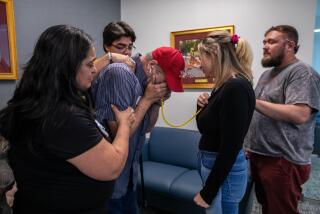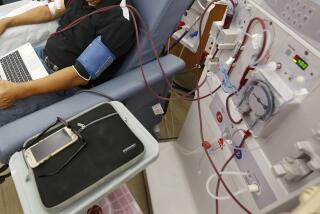Countywide : Boy of 4 Awaits Donor Kidney
- Share via
“Here we go again,” 4-year-old kidney dialysis patient Adam Chambers said with an air of quiet acceptance as his catheter dressing was changed Tuesday at the St. Joseph Hospital Renal Center in Orange.
The Anaheim preschooler, who has a congenital kidney disorder, cried a little bit as the adhesive tape was pulled off his chest, but he soon returned to playing with his toys as he waited for the dialysis machine to do what his one remaining kidney can’t--cleanse his blood.
For three hours a day, three days a week, Adam undergoes dialysis treatments. But if all goes well and he receives a kidney transplant, which his parents expect in the next two years, Adam will be freed from this demanding medical routine and will be able to lead a relatively normal life.
Adam is one of an estimated 40,000 people in the country who are waiting to receive a vital organ such as a kidney, liver, heart, lung or pancreas. The problem is that only 4,500 people donate organs each year, medical officials note in conjunction with National Organ and Tissue Donor Awareness Week.
Julie Juliusson, communications coordinator for the National Kidney Foundation of Southern California, said many people have misconceptions about organ transplants.
“They think if they donate the organ of a loved one, it will go to the highest bidder,” Juliusson said, “and that’s not true.” There is a national waiting list for transplants, she said, and recipients are chosen on the basis of health, blood and tissue types, age and other factors.
Another misconception, according to Juliusson, is that a potential donor’s responsibilities end when he signs the Uniform Donor Card. Potential donors need to tell family members about their desire to donate organs, because those relatives will be the ones asked to sign consent forms that may save someone’s life, Juliusson said.
“To people who are in need,” Juliusson said, “the greatest gift is the gift of life, the gift of an organ. It’s a second chance.”
For more information on vital-organ donations, call the National Kidney Foundation at (800) 747-5527.
More to Read
Sign up for Essential California
The most important California stories and recommendations in your inbox every morning.
You may occasionally receive promotional content from the Los Angeles Times.













